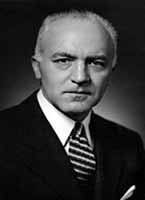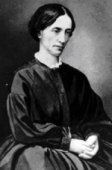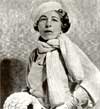
Travis McDade
Born:
Connection to Illinois: McDade is curator of law rare books at the University of Illinois College of Law. Biography: Travis McDade is a leading expert on crimes against rare books, maps, documents, and other printed cultural heritage resources.
Awards:
Web: https://experts.illinois.edu/en/persons/travis-w-mcdade
Web: https://legaltalknetwork.com/guests/travis-mcdade/
WorldCat: http://www.worldcat.org/search?q=Travis++McDade
Selected Titles
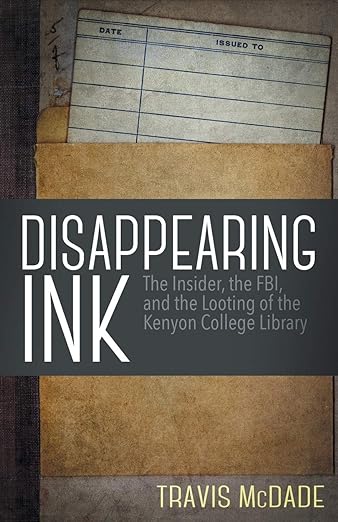 |
Disappearing Ink: The Insider, the FBI, and the Looting of the Kenyon College Library ISBN: 1682301486 OCLC: 920820523 Diversion Books New York, NY : 2015 Like many aspiring writers, David Breithaupt had money problems. But what he also had was unsupervised access to one of the finest special collections libraries in the country. In October 1990 Kenyon College hired David Breithaupt as its library’s part-time evening supervisor. In April 2000 he was fired after a Georgia librarian discovered him selling a letter by Flannery O’Connor on eBay, but that was only the tip of the iceberg: for the past ten years, Breithaupt had been browsing the collection, taking from it whatever rare books, manuscripts, and documents caught his eye―Flannery O'Connor letters, W.H. Auden annotated typescripts, a Thomas Pynchon manuscript, and much, much more. It was a large-scale, long-term pillaging of Kenyon College’s most precious works. After he was caught, the American justice system looked like it was about to disappoint the college the way it had countless rare book crime victims before―but Kenyon refused to let this happen. |
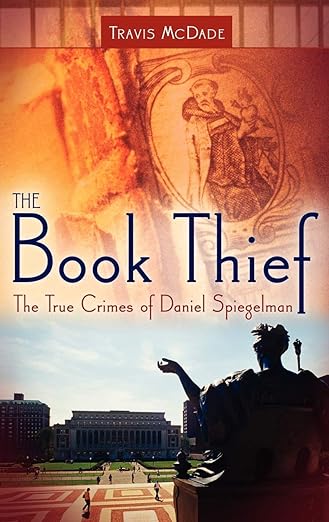 |
The Book Thief: The True Crimes of Daniel Spiegelman ISBN: 0275993310 OCLC: 70921412 Praeger Pub Text 2006 In the spring of 1994, Daniel Spiegelman shinnied up an abandoned book lift in Columbia University's Butler Library, dismantled a wall, stole books, reassembled the wall, and snuck back down the shaft. Over a three-month period he did this more than a dozen times. He eventually escaped to Europe with roughly $1.8 million in rare books, letters and manuscripts. When he was caught in the Netherlands, he tried to avoid extradition to the U.S. by telling the Dutch authorities he was a financier of the Oklahoma City bombing—knowing they wouldn't extradite someone facing the death penalty. Eventually, the FBI got him back to New York, where he finally stood trial for his crimes. Including a retelling of the crimes, dialogue from the court transcripts, and explanations of the legal consequences and intricacies, McDade recounts all the sordid elements of this true crime caper in vivid detail. In the spring of 1994, Daniel Spiegelman shinnied up an abandoned book lift in Columbia University's Butler Library, dismantled a wall, stole books, reassembled the wall, and snuck back down the shaft. Over a three-month period he did this more than a dozen times. He eventually escaped to Europe with roughly $1.8 million in rare books, letters and manuscripts. When he was caught in the Netherlands, he tried to avoid extradition to the U.S. by telling the Dutch authorities he was a financier of the Oklahoma City bombing— knowing they wouldn't extradite someone facing the death penalty. Eventually, the FBI got him back to New York, where he finally stood trial for his crimes. Four years, four attorneys, one determined librarian, numerous court appearances, and one guilty plea after the initial crime took place, a federal judge in the United States District Court for the Southern District of New York meted out a sentence that ran counter to the plea agreement, nearly doubling the ordinary sentence for a crime of that magnitude. In so doing, he created a new justification for departure from Federal Sentencing Guidelines. Basing his decision on the potential harm inflicted on society as a whole by the theft of rare and unique elements of our cultural heritage, Judge Kaplan redefined the value of such rare items and justified his sentencing by determining the value to be beyond the monetary realm. McDade recounts all the sordid elements of this true-crime caper in vivid detail, presenting readers with a retelling of the crimes, dialogue from the court transcripts, and explanations of the legal consequences and intricacies. In addition to the significant, overall legal themes, The Book Thief describes two prison escape attempts, one suicide attempt, a jailed defense lawyer, and the aftermath of this unique and interesting case. |
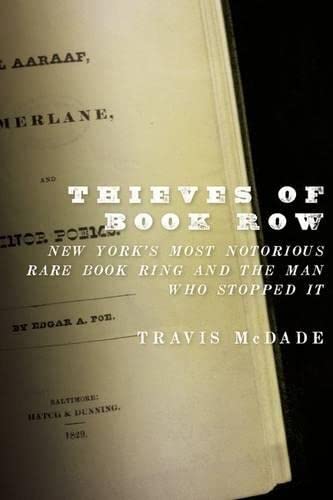 |
Thieves of Book Row: New York's Most Notorious Rare Book Ring and the Man Who Stopped It ISBN: 0199922667 OCLC: 958574255 Oxford University Press New York : 2013 No one had ever tried a caper like this before. The goods were kept in a secure room under constant scrutiny, deep inside a crowded building with guards at the exits. The team picked for the job included two old hands known only as Paul and Swede, but all depended on a fresh face, a kid from Pinetown, North Carolina. In the Depression, some fellows were willing to try anything -- even a heist in the rare book room of the New York Public Library. In Thieves of Book Row, Travis McDade tells the gripping tale of the worst book-theft ring in American history, and the intrepid detective who brought it down. Author of The Book Thief and a curator of rare books, McDade transforms painstaking research into a rich portrait of Manhattan's Book Row in the 1920s and '30s, where organized crime met America's cultural treasures in dark and crowded shops along gritty Fourth Avenue. Dealers such as Harry Gold, a tough native of the Lower East Side, became experts in recognizing the value of books and recruiting a pool of thieves to steal them -- many of them unemployed men who drifted up the Bowery or huddled around fires in Central Park's shantytowns. When Paul and Swede brought a new recruit into his shop, Gold trained him for the biggest score yet: a first edition of Edgar Allan Poe's Al Aaraaf, Tamerlane and Minor Poems. Gold's recruit cased the rare-book room for weeks, searching for a weakness. When he found one, he struck, leading to a breathtaking game of wits between Gold and NYPL special investigator G. William Bergquist. Both a fast-paced, true-life thriller, Thieves of Book Row provides a fascinating look at the history of crime and literary culture. |
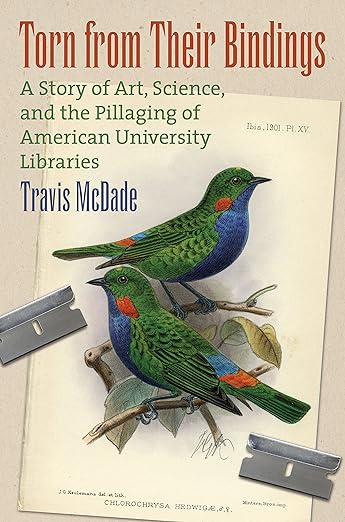 |
Torn from Their Bindings: A Story of Art, Science, and the Pillaging of American University Libraries ISBN: 0700626379 OCLC: 1013481790 Univ Pr of Kansas 2018 In 1980, an antique print dealer was going broke from competition and lack of supply. Then he discovered all the high-quality antique prints he could ever wantfor freeon the shelves of American university libraries. Torn from Their Bindings tells the story of Robert Kindred's brazen theft of irreplaceable antique illustrations and maps from academic libraries across the country a crime spree that left the irredeemable wreck of countless rare books in its wake. Travis McDade's account of Kindred's pillaging and the paper trail that led to his capture unfolds with the drama of a true crime page-turner whose pages are replete with the particulars of archival treasures, library science, print preservation, and the history bound up in the cultural heritage plundered by Kindred. Along the way we observe the nature and methods of the book thief, defacer of priceless volumes and purveyor of purloined pages, and acquire a wealth of knowledge about the antique prints he favored. Told by an author devoted to the preservation of books, the story is propelled by an informed curiosity and just outrage from its suspenseful opening to its ironic conclusion the ultimate fate of Kindred's spoils. |


